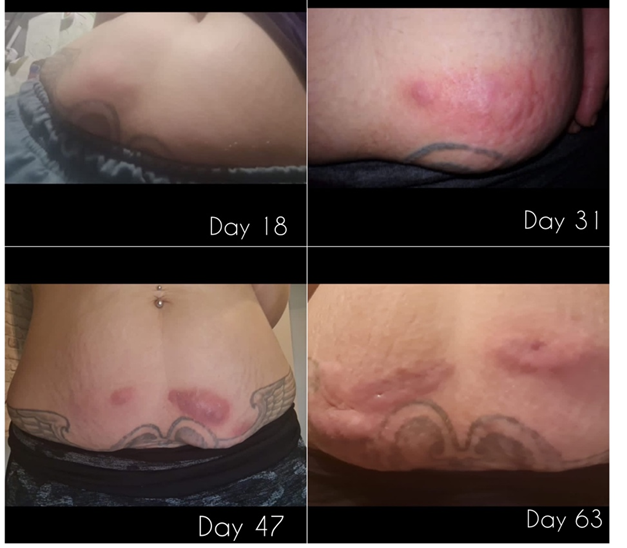Fat-dissolving injections are increasingly becoming popular in cosmetic injectables, but why?
Many men and women consider local deposits of fatty tissue unattractive and therefore unacceptable cosmetically. A negative impact on appearance can contribute to reduced self-esteem and insecurity. A raising popular Aesthetic treatment for this is lipolysis injections also known as “fat dissolving injections”. This non-invasive method for fat reduction is highly advantageous over surgical reductions which have serious risks associated with it, therefore non-surgical methods would have important clinical benefits.
Clinical studies provide evidence-based data to suggest that deoxycholic acid injections provide significant clinical benefits, such as a generally safe and free of complication method for fat reduction (Mokosch,2012). The active ingredient Deoxycholic Acid (DC) is present in the human body and is a secondary bile acid that is produced by the liver and used to break up fat for intestinal absorption.
Fat-dissolving injections are deemed as medical devices regulated by the Medicines and Healthcare products Regulatory Agency (MHRA). Currently, medical devices placed on the UK market must have a UKCA or CE marking, which symbolises the manufacturer's claim that the product meets all the general safety and performance requirements. It is unknown exactly how many fat dissolving injections are registered as medical devices. However, some popular brands known on the market are Aqualyx, Belkyra, and Desoface, although we know there are many other fat-dissolving injectable brands available.
Case study:
A 38-year-old woman presented to ED with, ‘spots on abdomen’. This lady has no previous medical history, not taking any medications prescribed or over the counter, and has no known drug allergies. On consultation, the patient declared she had fat dissolving injections into her lower abdomen 18 days ago and has subsequently developed several hard abscesses. On abdominal examination, the patient had 4 erythematous, swollen lumps. On palpation, firm masses, hot and tender to touch with no pustule heads visible. The patient’s vital signs were all within normal parameters and she appeared systemically well.
The patient reported to have been given ‘Aqualyx’ brand of fat-dissolving injection and further disclosed that she had been to see a beautician with no medical background for this treatment.
The patient was diagnosed with abdominal abscesses post fat dissolving injections. Abscesses typically form when bacteria enter the skin, as more bacteria multiply the body naturally forms a wall around the area to stop the bacteria from spreading to other parts of the body. As the bacteria multiply in the pocket it becomes more swollen and more painful. Ordinarily, this patient would have been referred to the surgical team for management, however, due to the Covid-19 pandemic and the UK being in a national lockdown, operating theatres were only operating for life-threatening conditions, therefore surgical options were, unfortunately, unavailable to the patient at this point in time.
As the patient was systemically well and vital signs stable, the patient has discharged on Flucloxacillin 500mg QDS 7/7 as per local trust antimicrobial prescribing policy to cover gram-positive bacteria. The patient was further advised to apply heat and to observe good personal hygiene.
Robust safety netting advice was given prior to discharge and advised to return to ED should any red flags arise.
 Fig 1
Fig 1

Due to lockdown restraints, the patient was seen in the clinic 14 months post initial consultation in ED.
The patient reports in retrospect that after the initial prescription of flucloxacillin the lumps started to form pustule heads. After applying warm compresses every 2-4 hours around day 31 the lumps had started to burst, which heightened around day 63.
The patient managed the wounds and dressings herself with things she had brought from the counter in pharmacies.
This patient is among a soaring number of other patients reporting complications after fat dissolving injections.
With the confirmation of counterfeit products readily available in the UK it is highly concerning as the risk to the general public is alarming.
As medical practitioners, we have a duty of care to our patients and the public.
It is our duty to create an awareness of Aesthetic procedure complications as this forms part of our consenting process but also we have an ethical obligation to report the misuse of medicines regarding supply or unsuitable practitioners carrying out treatments.

With their highly experienced Aesthetic Nurse Practitioner and extensive services you can rest assured that Nurseology Aesthetics can help with any facial aesthetic concern.
Call Aysha on 07496 935 888 or visit Nurseology.

Hey, wait!
Before you go.....
Let's stay in touch, pop your details here and we'll send our editor's hand-picked updates on your fave subjects.